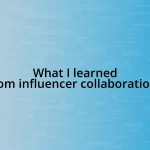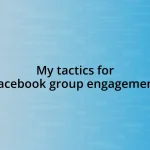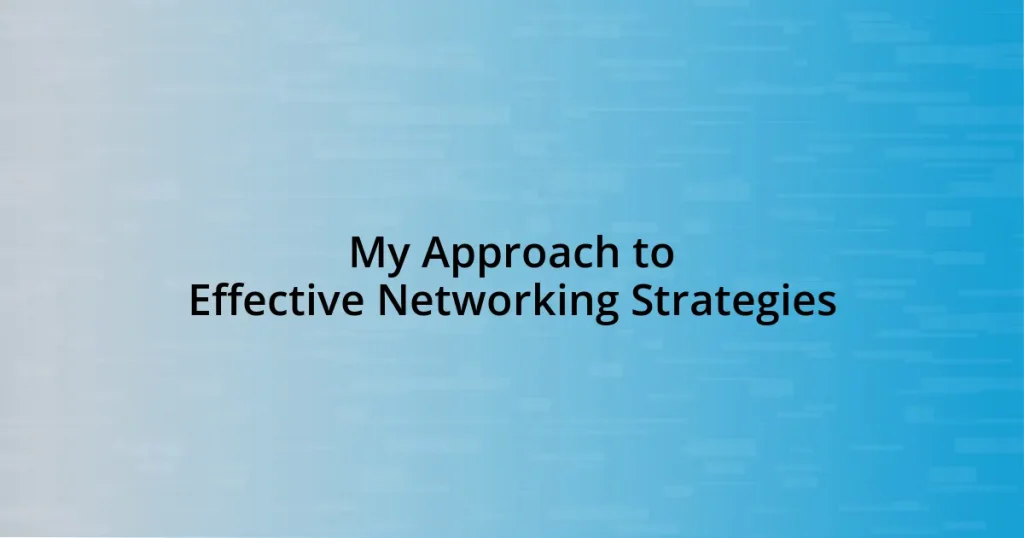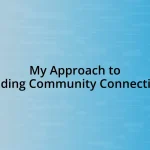Key takeaways:
- Networking is about building genuine relationships through authenticity, active listening, and curiosity, rather than superficial exchanges.
- A strong personal brand is essential; defining values, creating an elevator pitch, and maintaining consistency across platforms can foster meaningful connections.
- Identifying networking opportunities is proactive; engaging in everyday conversations and leveraging online platforms can lead to unexpected connections.
- Following up and staying engaged are crucial for nurturing relationships, as personalized interactions can turn acquaintances into allies.
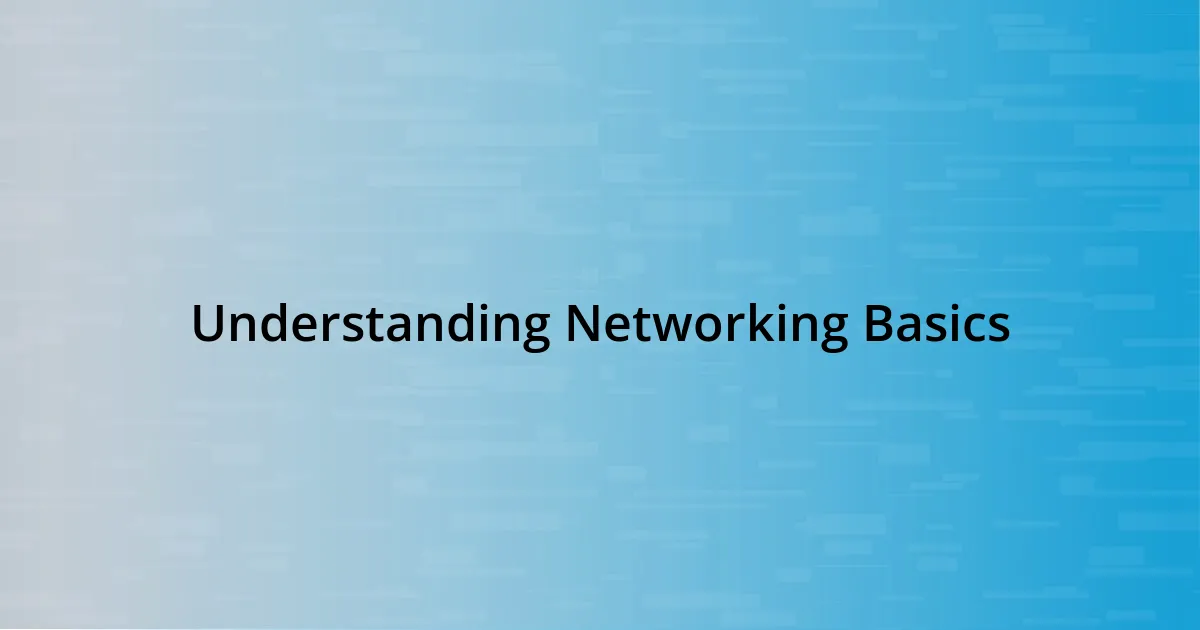
Understanding Networking Basics
Building a solid foundation in networking starts with understanding its core principles. It goes beyond simple exchanges of business cards; it’s about creating genuine relationships. Have you ever left a networking event feeling like you made no real connections? I certainly have, and it can be disheartening.
A memorable experience for me was attending a small industry seminar where, instead of mingling superficially, I took the time to engage deeply with just a few attendees. We shared stories, challenges, and insights. That day, I realized that networking is as much about what you put into it as what you get out of it. When you approach connections with authenticity, the relationships you build often become stronger and more rewarding.
Moreover, effective networking requires active listening and curiosity. I’ve found that asking thoughtful questions not only helps to foster conversations but also shows genuine interest. Think about it—how often do we feel valued when someone truly listens? That simple act can transform a mundane handshake into a meaningful interaction, creating lasting networks that support us both personally and professionally.
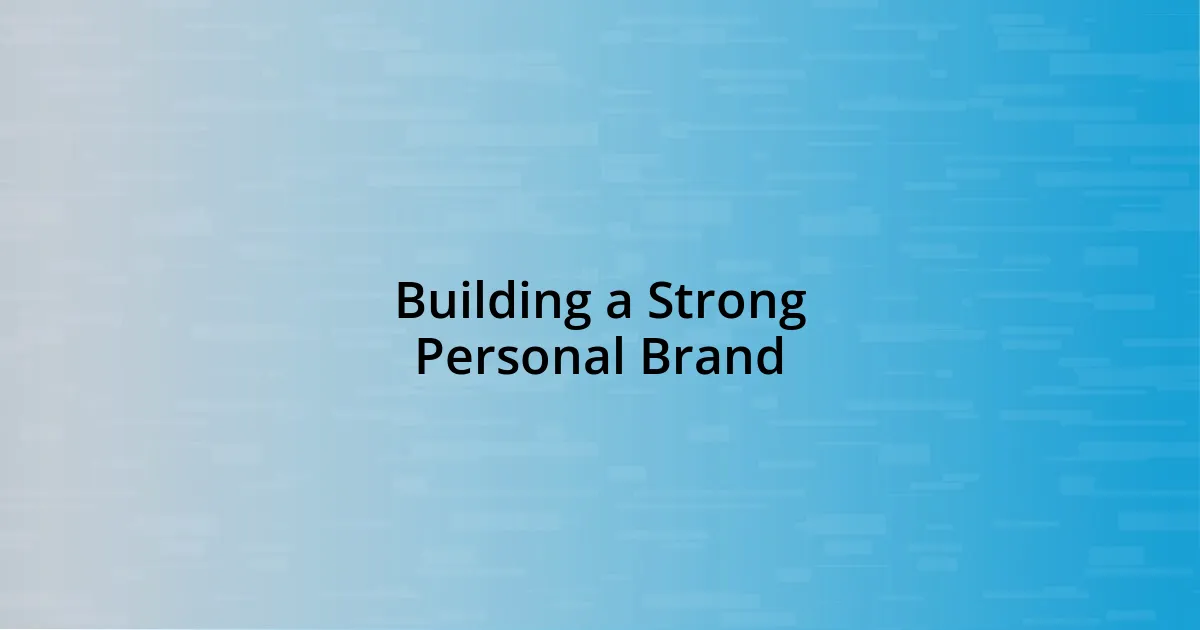
Building a Strong Personal Brand
Building a strong personal brand is essential in networking. To me, it’s like crafting a narrative that others can identify with and remember. I remember when I first started to define my personal brand; I took a close look at what made me unique. I focused on my values, skills, and experiences, ensuring that they aligned with how I presented myself in networking situations. This clarity gave me confidence and made my interactions feel more genuine.
To effectively convey your personal brand, consider these strategies:
- Define Your Values: Identify what matters most to you and reflect those in your conversations.
- Craft Your Elevator Pitch: Create a concise description of who you are and what you do, tailored to different audiences.
- Use Social Media Wisely: Share content that resonates with your brand, showcasing your expertise and interests.
- Be Consistent: Ensure your online presence mirrors your offline interactions to build trust and recognition.
- Network Strategically: Seek connections that align with your personal brand, which fosters more meaningful relationships.
By focusing on these elements, you can cultivate an authentic personal brand that naturally draws people toward you.
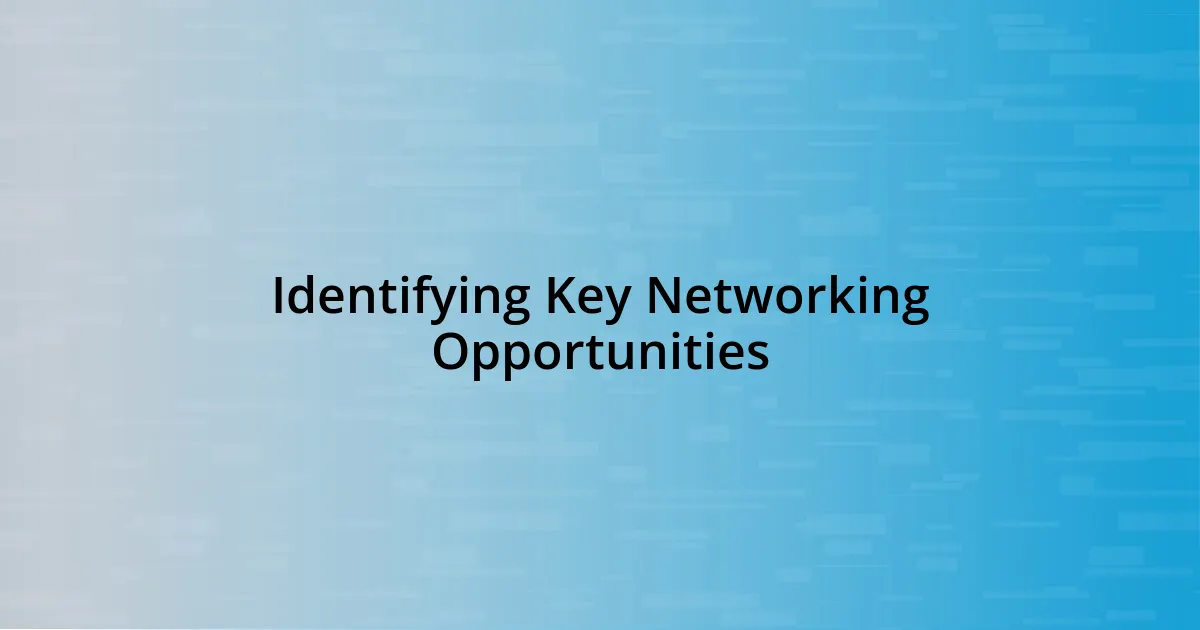
Identifying Key Networking Opportunities
Identifying key networking opportunities requires a keen eye for context and environment. For me, it’s often a matter of being proactive; I keep an eye on industry events, conferences, and even casual meet-ups that could lead to fruitful connections. A few years ago, I stumbled upon a local workshop that, at first glance, seemed unrelated to my field. However, it turned out to be a goldmine, allowing me to connect with professionals outside my usual circle and gain fresh perspectives.
The nuances of my daily routines can also present unexpected networking opportunities. Whether it’s chatting with a fellow gym-goer or striking up a conversation at a coffee shop, I’ve learned that every interaction could lead to new connections. I remember a day when I decided to engage with a stranger in line at a bookstore. It turned out they were involved in a project related to my interests. This taught me that being open and approachable can uncover opportunities in even the most mundane situations.
I believe leveraging online platforms is crucial as well. Social media and professional networks like LinkedIn provide accessible avenues to identify potential contacts. I often search for groups or discussions where my skills align with the interests of others. It’s not just about quantity but quality. Building meaningful relationships with a handful of individuals can sometimes be more rewarding than collecting numerous contacts.
| Method | Description |
|---|---|
| Industry Events | Attend conferences or workshops relevant to your field. |
| Daily Interactions | Engage in casual conversations during everyday activities. |
| Online Platforms | Utilize social media and networks to connect with professionals. |
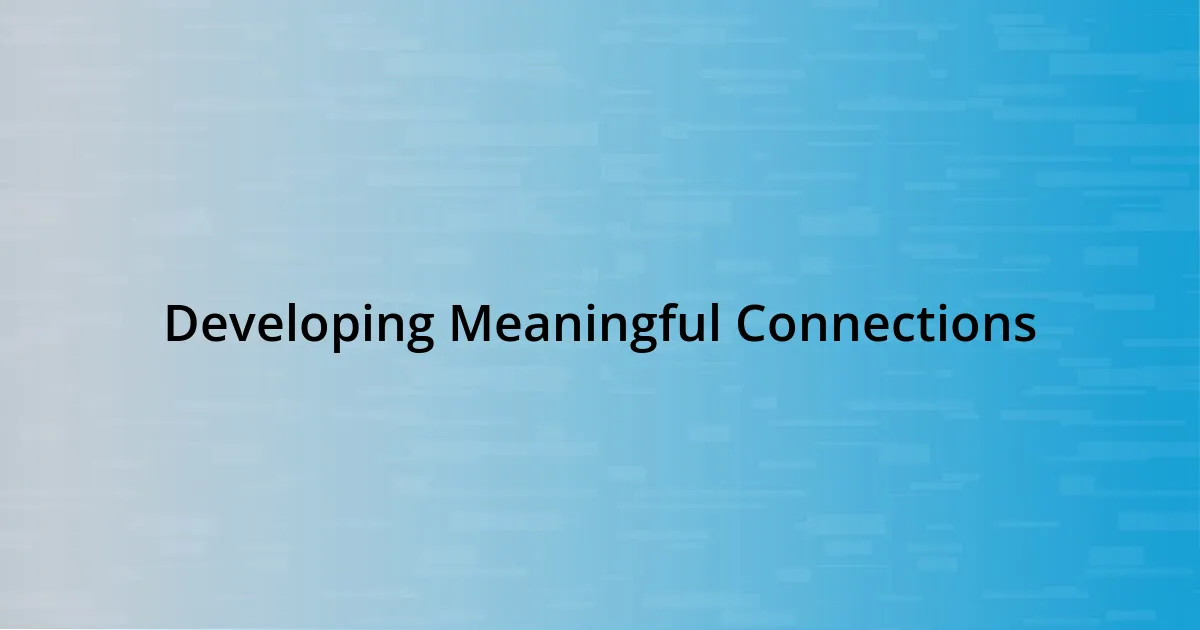
Developing Meaningful Connections
Developing meaningful connections is all about authenticity. I once attended a small networking event where I met someone who was genuinely interested in my passion for sustainable design. Instead of promoting myself through a rehearsed pitch, I shared a personal story about my journey in that field. The conversation flowed naturally, and we found common ground, which led to a collaboration down the line. Isn’t it amazing how a heartfelt exchange can turn what could have been a superficial interaction into something impactful?
It’s essential to be a good listener when building connections. One time, while volunteering at a community event, I met a woman who shared her experience working in non-profit organizations. I discovered how much we had in common, not just professionally, but personally as well. By being fully present and asking her questions about her journey, I learned about opportunities that I wouldn’t have otherwise considered. Isn’t that the beauty of connection? It’s not just about talking; it’s about really hearing one another.
I also find that following up on conversations cements those connections. After chatting with a few folks at a recent seminar, I took the time to send them personalized messages on LinkedIn. I referenced specific points from our talks that resonated with me, which made the interaction feel genuine and thoughtful. In one instance, this led to a coffee meeting where we explored project ideas together. Have you noticed how a simple follow-up can make someone feel valued and open doors to future opportunities? Each connection you nurture has the potential to flourish into something significant.
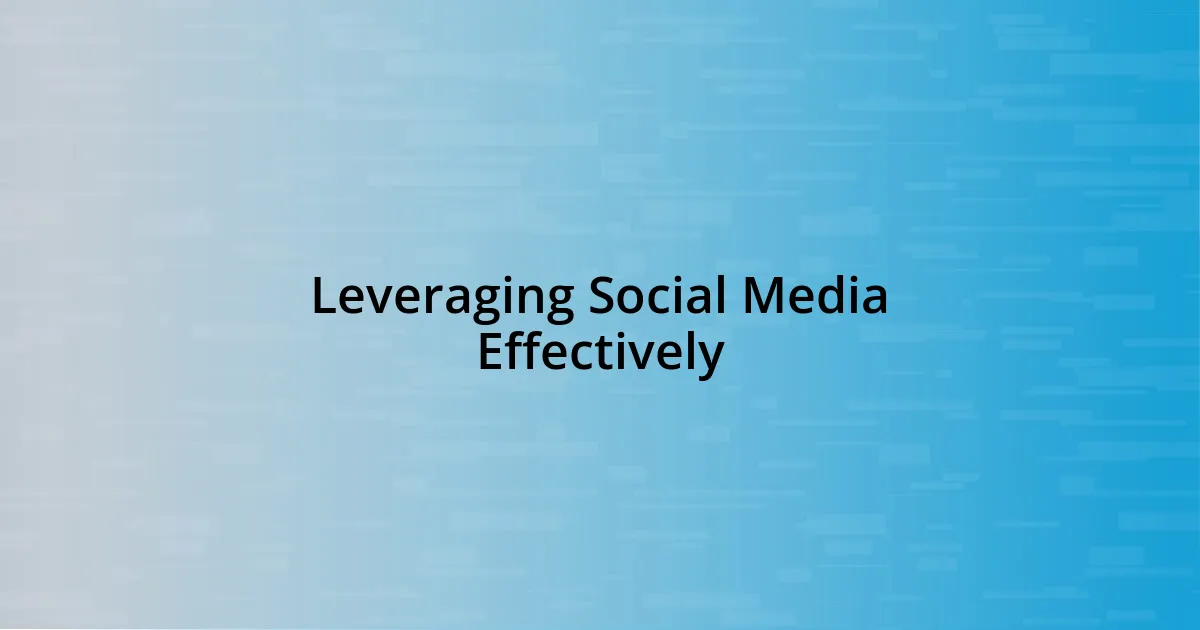
Leveraging Social Media Effectively
Leveraging social media effectively has transformed how I approach networking. I remember when I started using Twitter to follow industry leaders and engage with their content. By responding to their tweets and joining conversations, I built relationships that felt more like friendships than business transactions. Have you tried reaching out through a casual comment? You might be surprised at how approachable these figures can be.
Another key aspect for me is consistency. I make it a point to share my insights on LinkedIn regularly. This not only positions me as a thought leader in my field but also invites others to interact with my posts. In fact, I once received a direct message from someone who resonated with a topic I wrote about. That simple exchange sparked a dialogue that eventually led to a collaborative project. Isn’t it incredible how a few keystrokes can kickstart something meaningful?
Lastly, I find value in understanding the algorithms of these platforms. By joining niche groups on Facebook or participating in Twitter chats, I can reach specific audiences who share my interests. One time, I joined an event on Clubhouse focused on creative problem-solving, and that led to a surprise invitation to contribute to an industry publication. Have you ever considered how understanding a platform’s workings can open up new pathways for connection? It’s these strategic choices that can truly enhance our networking effectiveness.
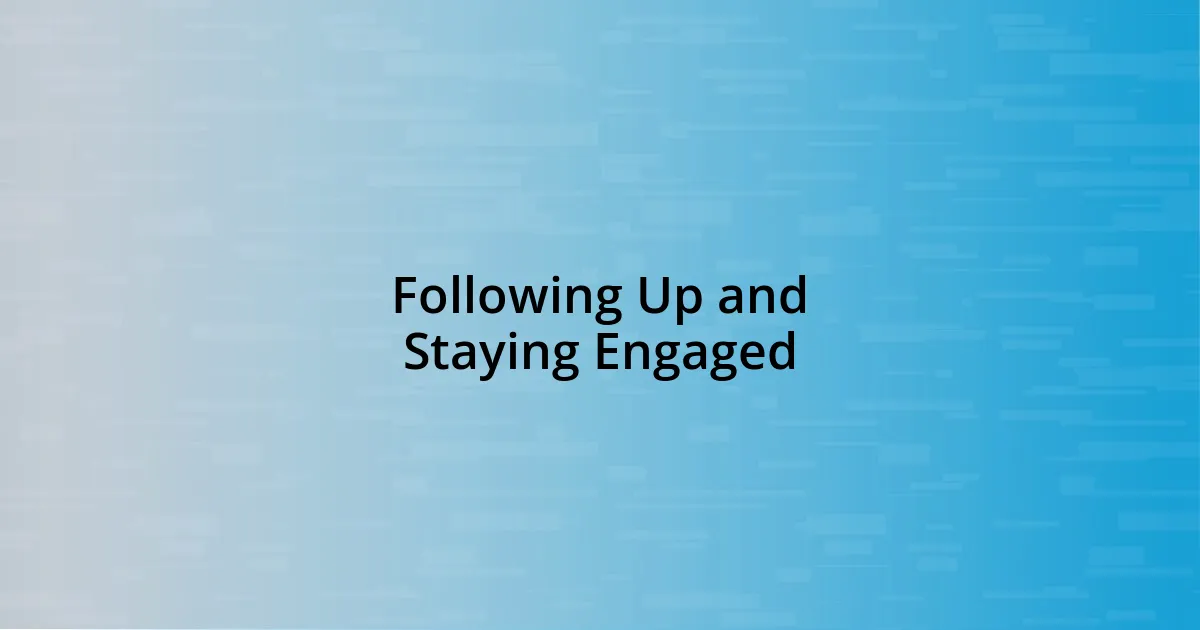
Following Up and Staying Engaged
Following up is more than just a polite gesture; it’s an essential part of forming lasting connections. Recently, I reached out to someone I’d met at a conference by sharing an article that I thought would interest them. The excitement in their reply confirmed that my effort to stay engaged made an impact. Have you ever noticed how a thoughtful follow-up can turn acquaintances into allies in your professional journey?
Staying engaged can come in various forms. I make it a habit to comment on updates from my connections, not just with a thumbs-up, but with genuine insights. Just last week, one friend posted about her recent project and I shared how her approach resonated with my experiences. This dialogue sparked a series of exchanges, revealing new opportunities for collaboration. It’s funny how a simple comment can deepen your relationship and lead to unexpected possibilities, isn’t it?
Moreover, I find joy in remembering important details about the people I network with. I once sent a birthday message to a contact I hadn’t spoken to in a while, referencing a conversation we had about her love for traveling. She appreciated the effort, and it turned into a delightful catch-up. Engaging on a personal level makes all the difference. Have you ever tried using such small acts to foster rapport? It’s often these moments that transform networking into a meaningful experience.
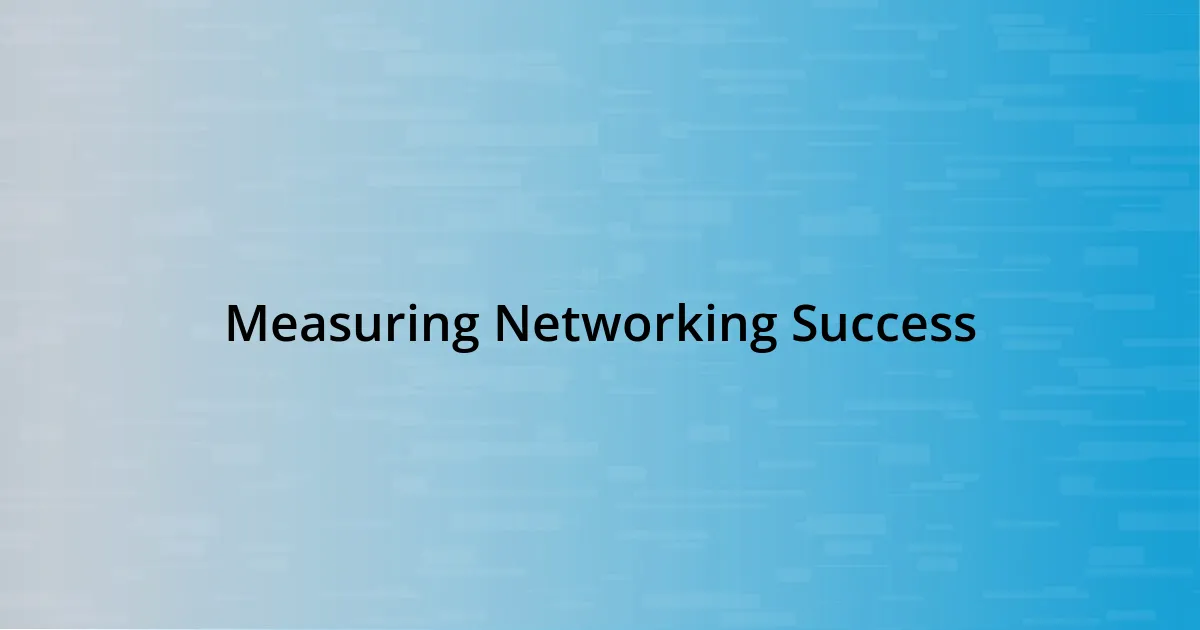
Measuring Networking Success
Measuring the success of networking can often feel elusive. I once attended a networking event where I connected with several people, but only realized weeks later how those conversations translated into opportunities. I remember receiving an email from one of the attendees who was inspired to collaborate on a project because of our brief exchange. Have you ever tracked connections that blossomed long after a conversation ended?
One tangible way I assess networking success is through follow-up interactions. For instance, I keep a spreadsheet of my connections and note any significant discussions or plans we made. Recently, I reached out to someone I hadn’t spoken to in months, referencing a conversation about a shared interest. The immediate positive response was a reminder that even casual chats could lead to ongoing relationships. Isn’t it interesting how the little details can pave the way for future engagement?
Additionally, I measure success by the quality of relationships rather than their quantity. I recall attending a monthly meet-up and choosing to focus on just a handful of meaningful conversations. This choice led to deeper discussions that resulted in mutual support and collaboration. I often ask myself: Are my networking efforts fostering genuine relationships? When I reflect on these connections, the answer is often a resounding yes, reaffirming the importance of nurturing the relationships that truly matter.







